Overview
The article emphasizes the critical automation trends in title services that are revolutionizing operational efficiency. It underscores how technologies such as machine learning, optical character recognition (OCR), and blockchain are enhancing essential processes like document processing, risk assessment, and customer engagement. Consequently, these advancements lead to improved accuracy, reduced costs, and the cultivation of stronger client relationships within the real estate sector.
Introduction
The title services industry is experiencing a profound transformation as automation technologies redefine operational efficiency and client engagement. Innovations such as machine learning, optical character recognition, blockchain, and AI-driven compliance tools promise to not only streamline processes but also enhance accuracy and customer satisfaction.
However, as firms race to adopt these advancements, a critical question arises: how can organizations effectively navigate the complexities of integrating these technologies while ensuring they meet evolving client expectations and regulatory standards?
Parse AI: Revolutionizing Title Research with Machine Learning and OCR
Parse AI harnesses the power of machine learning and optical character recognition (OCR) to automate the extraction of vital information from document titles, aligning with current automation trends in title services. This innovative approach enables researchers to efficiently process large data sets, significantly cutting down the time needed to complete abstracts and reports. By streamlining these workflows, Parse AI not only enhances accuracy but also empowers real estate professionals to focus on higher-value strategic initiatives.
The integration of OCR technology has demonstrated the potential to improve operational efficiency by 40-60% within two years of implementation, showcasing the automation trends in title services and achieving an impressive return on investment (ROI) of 200% in the first year. Furthermore, case studies indicate that organizations utilizing intelligent document processing (IDP) solutions, such as those provided by Parse AI, can realize processing time reductions of up to 50%, illustrating the benefits of automation trends in title services.
For example, Arbor Realty Trust reported a straight-through processing rate exceeding 95% and data extraction accuracy surpassing 99%, showcasing the effectiveness of these technologies in the real estate sector. The adoption of advanced OCR technology is essential for maintaining a competitive edge and ensuring compliance in an increasingly complex landscape, particularly in light of the automation trends in title services, as the OCR market is projected to expand to USD 43.69 billion by 2032.
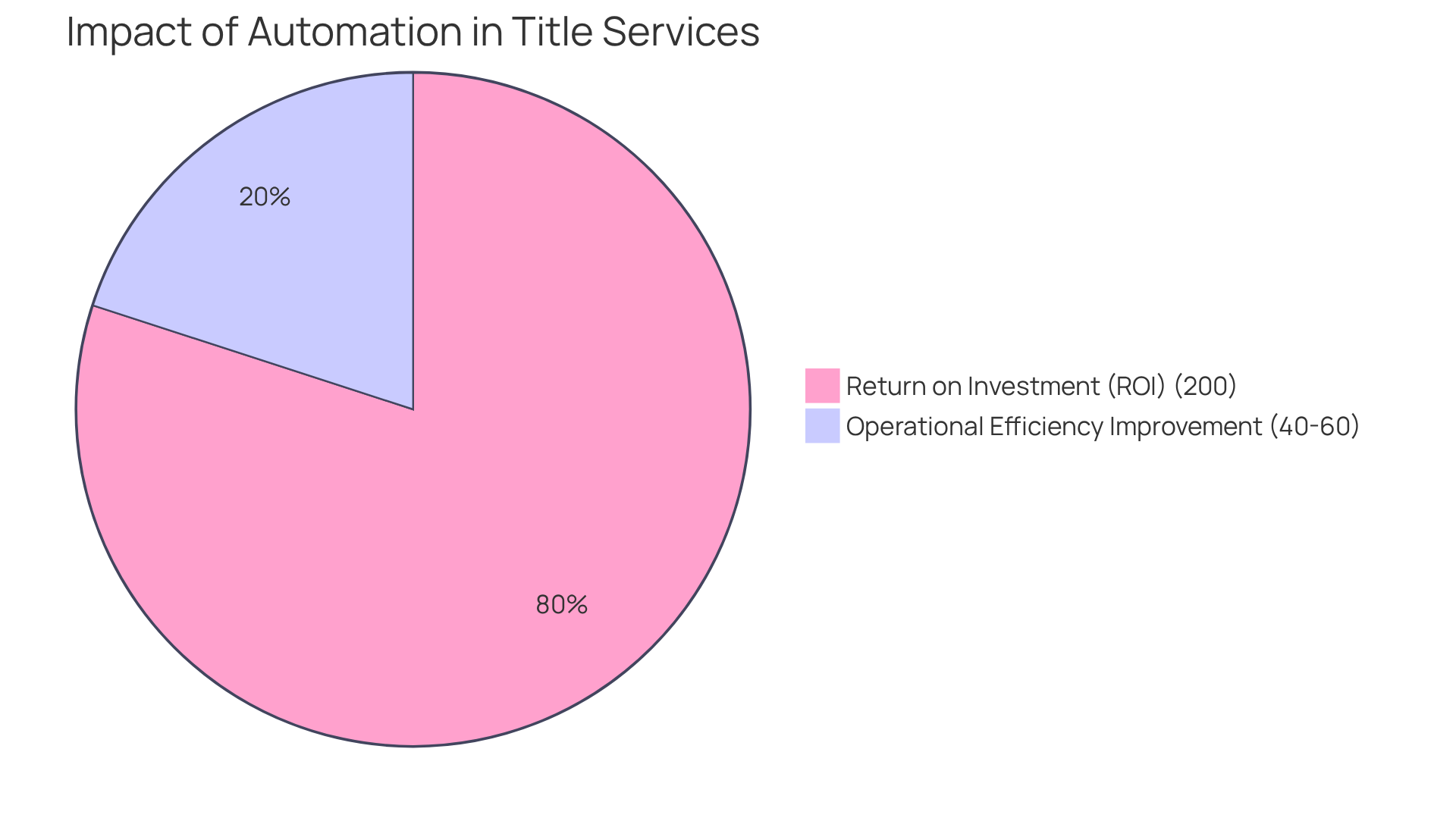
Generative AI: Enhancing Content Creation in Title Services
Generative AI tools significantly transform the production of reports, summaries, and marketing content for providers, enabling them to maintain consistent and effective communication with customers. By rapidly producing high-quality content, these tools save valuable time and ensure clarity in messaging. Consequently, this capability greatly enhances customer interaction and strengthens the overall effectiveness of title-related offerings by integrating automation trends in title services. As firms increasingly adopt these technologies related to automation trends in title services, they can anticipate improved responsiveness and a more streamlined workflow, ultimately leading to greater client satisfaction and retention.
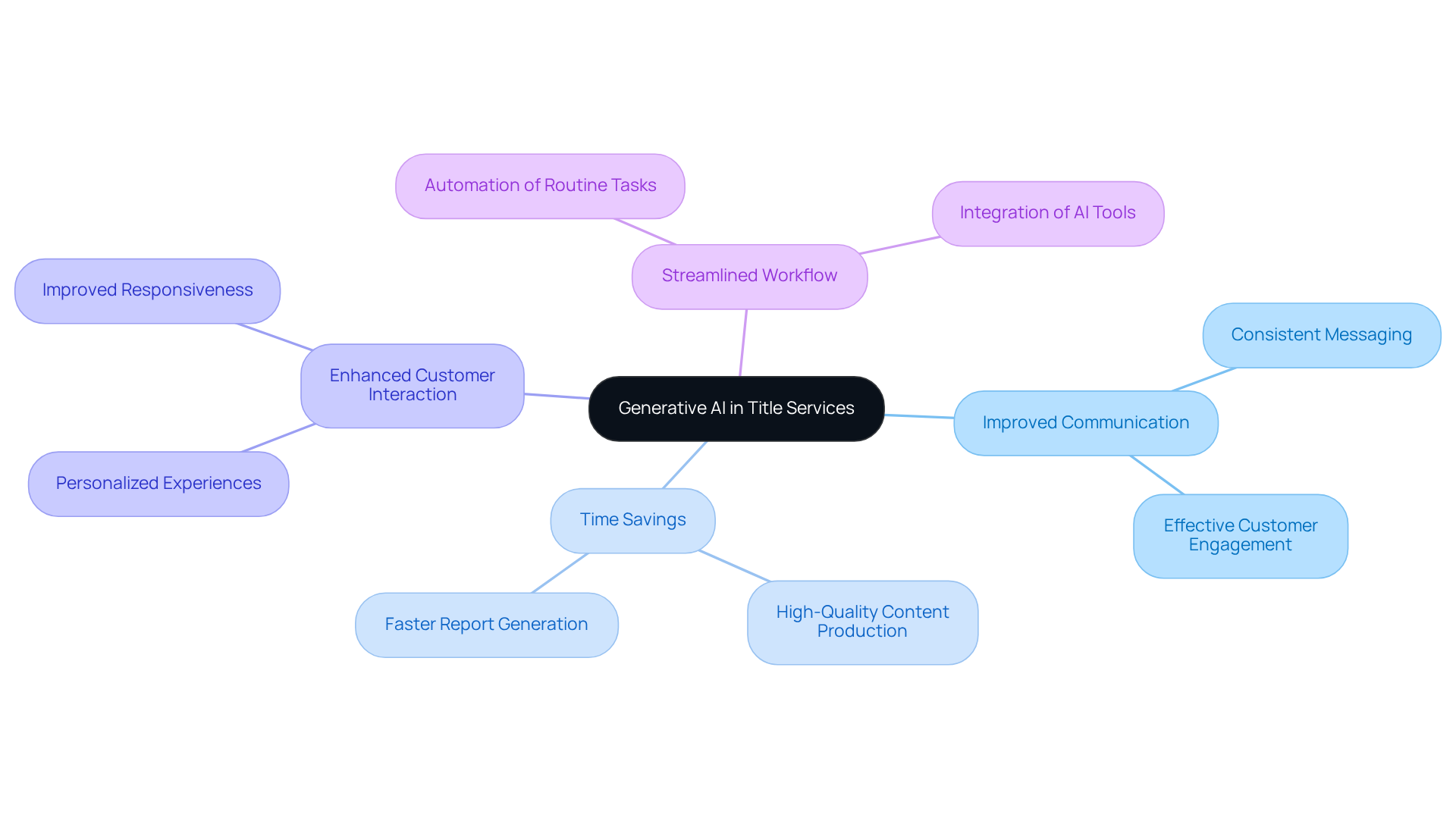
Predictive Analytics: Transforming Risk Assessment in Title Services
Predictive analytics harnesses historical data alongside machine learning algorithms to foresee potential risks in property transactions. By scrutinizing patterns and trends, provider companies can pinpoint warning signs, empowering them to make informed decisions that significantly mitigate the chances of disputes or legal complications.
With 13.46k risks evident in today’s global economic landscape, the necessity for proactive risk management is paramount. This approach is revolutionizing service providers' operations, fostering more secure and dependable transactions.
Current trends suggest that as machine learning advances, its incorporation into risk assessment tools will further refine the accuracy and efficiency of property transaction evaluations, ultimately yielding enhanced outcomes for all stakeholders involved.
As Justin Kirsch aptly stated, 'Predictive analytics is one of the most effective tools for mitigating risks in decision-making.
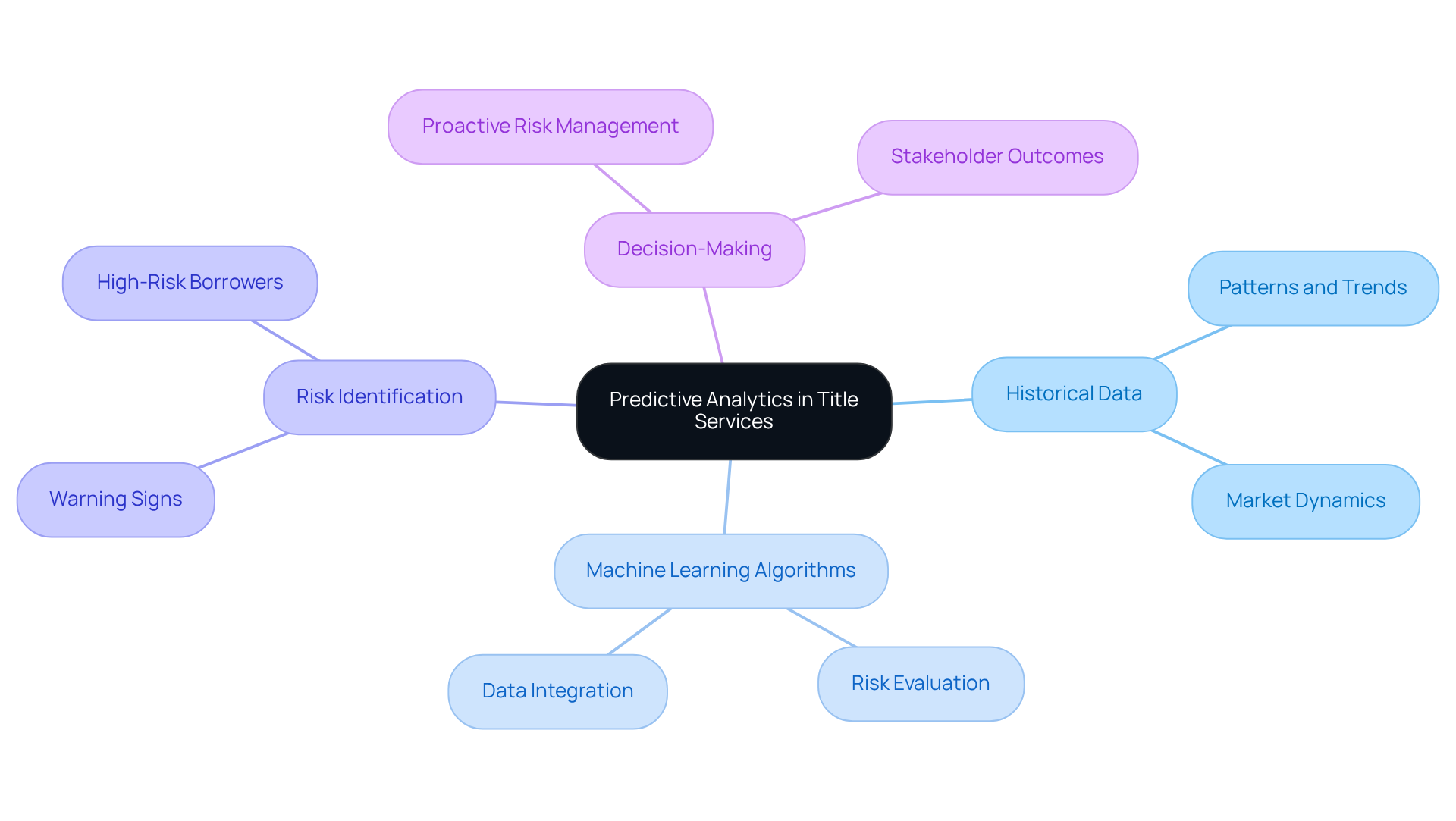
Automated Document Processing: Streamlining Title Searches
Automated document processing systems revolutionize the search for property ownership by efficiently sorting, categorizing, and analyzing ownership documents. This technology dramatically accelerates workflows, reducing clearance time from hours to mere minutes. By minimizing manual labor, these systems empower researchers to concentrate on higher-level analysis and strategic decision-making. The integration of automation not only boosts efficiency but also enhances search precision, with studies indicating that automated data entry can reduce errors by up to 90%.
For instance, an industry analytics firm achieved a remarkable 40% cost reduction through the implementation of advanced data extraction solutions. Furthermore, organizations employing Intelligent Document Processing (IDP) have reported processing time reductions exceeding 50%, facilitating faster approvals and elevating customer satisfaction. As the sector embraces these innovations, the benefits of automation trends in title services become increasingly evident, positioning firms for growth in a competitive landscape.
To bolster these advancements, Parse AI offers flexible subscription options, including monthly and annual plans, alongside a pay-as-you-go model, ensuring that researchers can select the optimal solution for their needs. Our customer success team stands ready to discuss tailored options that align with your specific requirements.
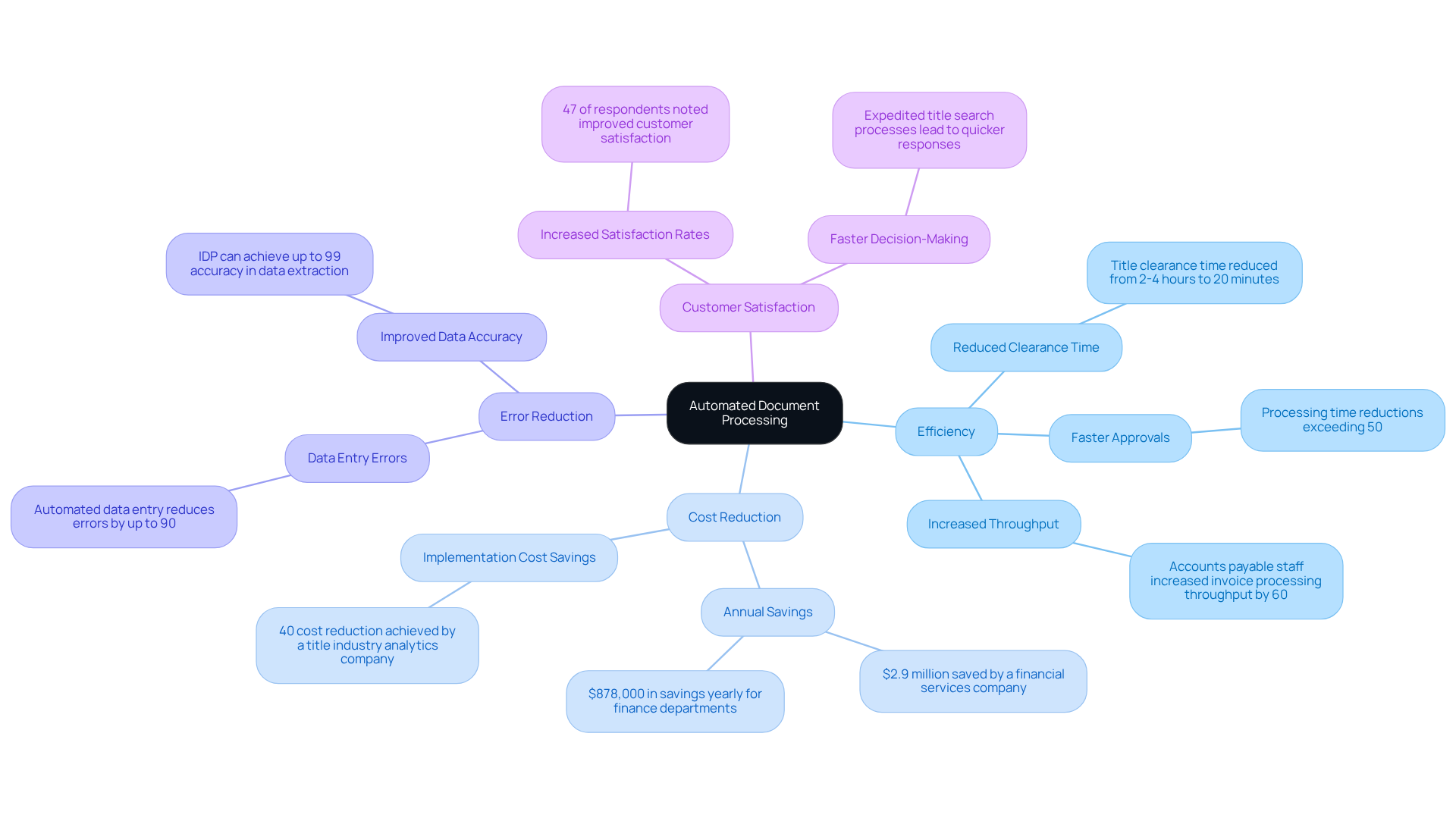
Chatbots: Improving Customer Interaction in Title Services
Chatbots are revolutionizing customer engagement in document assistance by providing immediate responses to inquiries and ensuring 24/7 support. By effectively managing routine questions and tasks, they allow human agents to focus on more complex issues, thereby significantly enhancing response times. This transformation not only elevates the overall customer experience but also incorporates automation trends in title services, making solutions more accessible and user-friendly.
For instance, organizations that implement chatbots have reported a 25% reduction in repeat inquiries, a clear indication of improved accuracy and efficiency. Furthermore, with 80% of consumers sharing predominantly favorable experiences with chatbots—14% of whom rate their interactions as 'very positive'—the integration of these AI tools is proving essential in boosting customer satisfaction within the real estate sector.
Additionally, chatbots can reduce customer support costs by up to 30%, underscoring their financial advantages. Consequently, real estate professionals can expect enhanced assistance provision and a more streamlined workflow, ultimately leading to increased customer retention and loyalty.
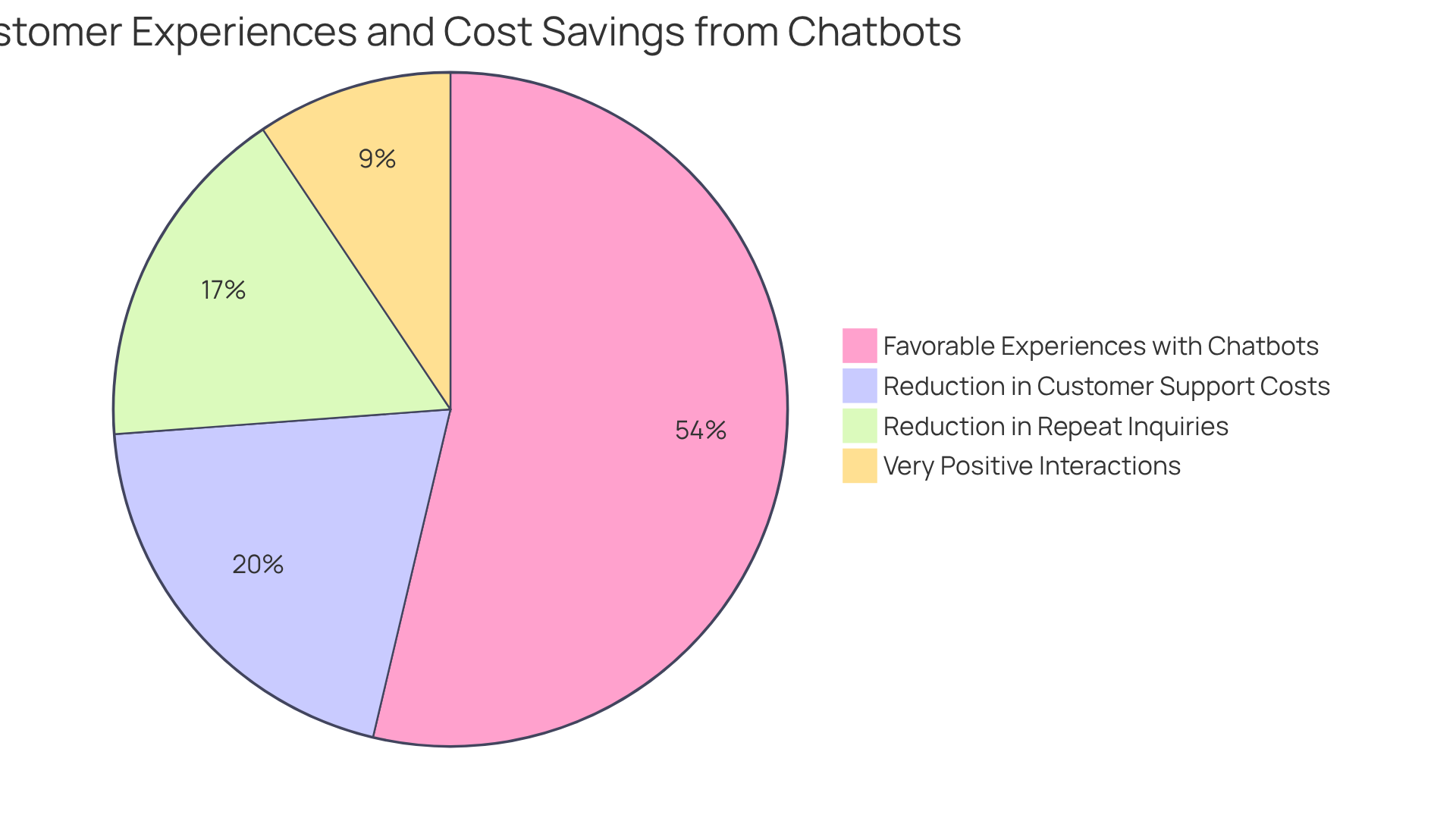
Omnichannel Marketing: Reaching Clients Across Multiple Platforms
Omnichannel marketing strategies empower title service providers to effectively engage with customers across diverse platforms, including social media, email, and websites. By delivering a seamless experience, businesses guarantee that customers encounter consistent messaging and support, irrespective of the channel they select. This cohesive strategy not only amplifies brand visibility but also cultivates stronger connections with customers.
Organizations boasting well-integrated channels retain nearly all customers, achieving an impressive retention rate of 89%. Furthermore, personalized omnichannel experiences can elevate sales by 15%, enhancing customer satisfaction and driving engagement. Studies reveal that omnichannel customers possess a 30% higher lifetime value compared to those who utilize only a single channel.
As the landscape of naming offerings evolves, embracing these tactics becomes essential for maintaining a competitive edge and meeting client expectations.
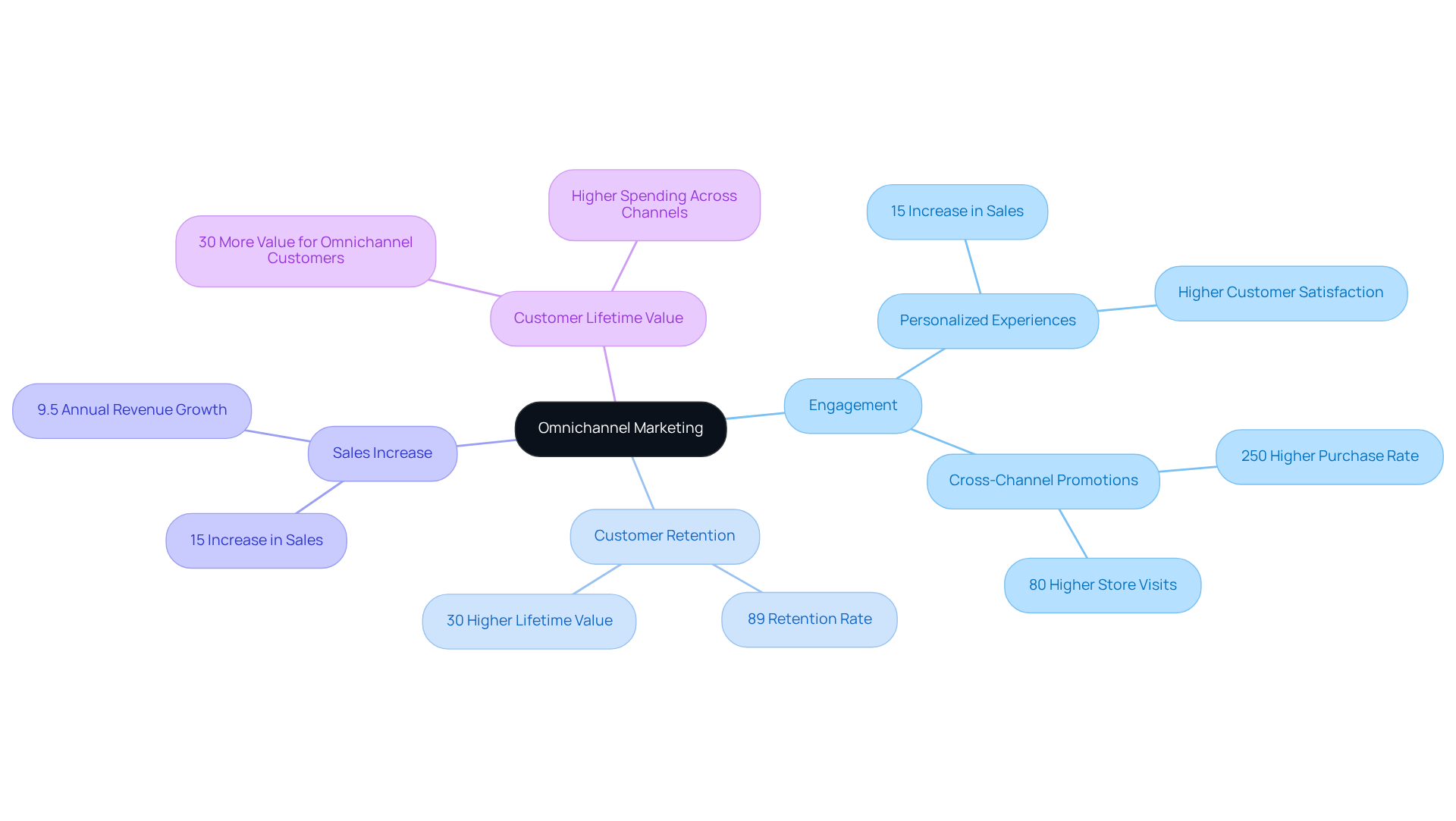
AI-Driven Compliance Tools: Ensuring Legal Adherence in Title Services
AI-driven compliance tools are essential for monitoring and analyzing ownership documents, ensuring adherence to legal standards and regulations. By proactively identifying potential compliance issues, these tools empower providers of title-related solutions to mitigate risks and avoid costly legal disputes. This proactive strategy not only enhances operational efficiency but also bolsters the credibility and reliability of property services.
For instance, organizations leveraging AI in compliance have reported substantial time savings, with the average compliance audit taking 35 hours less when AI is implemented. Furthermore, 54% of financial companies utilize AI to monitor transactions for unusual behavior, underscoring the technology's effectiveness in ensuring regulatory compliance.
As the landscape of ownership research evolves, the integration of AI-driven compliance tools becomes vital for ensuring that property services adhere to automation trends in title services, ultimately fostering trust and confidence among stakeholders.
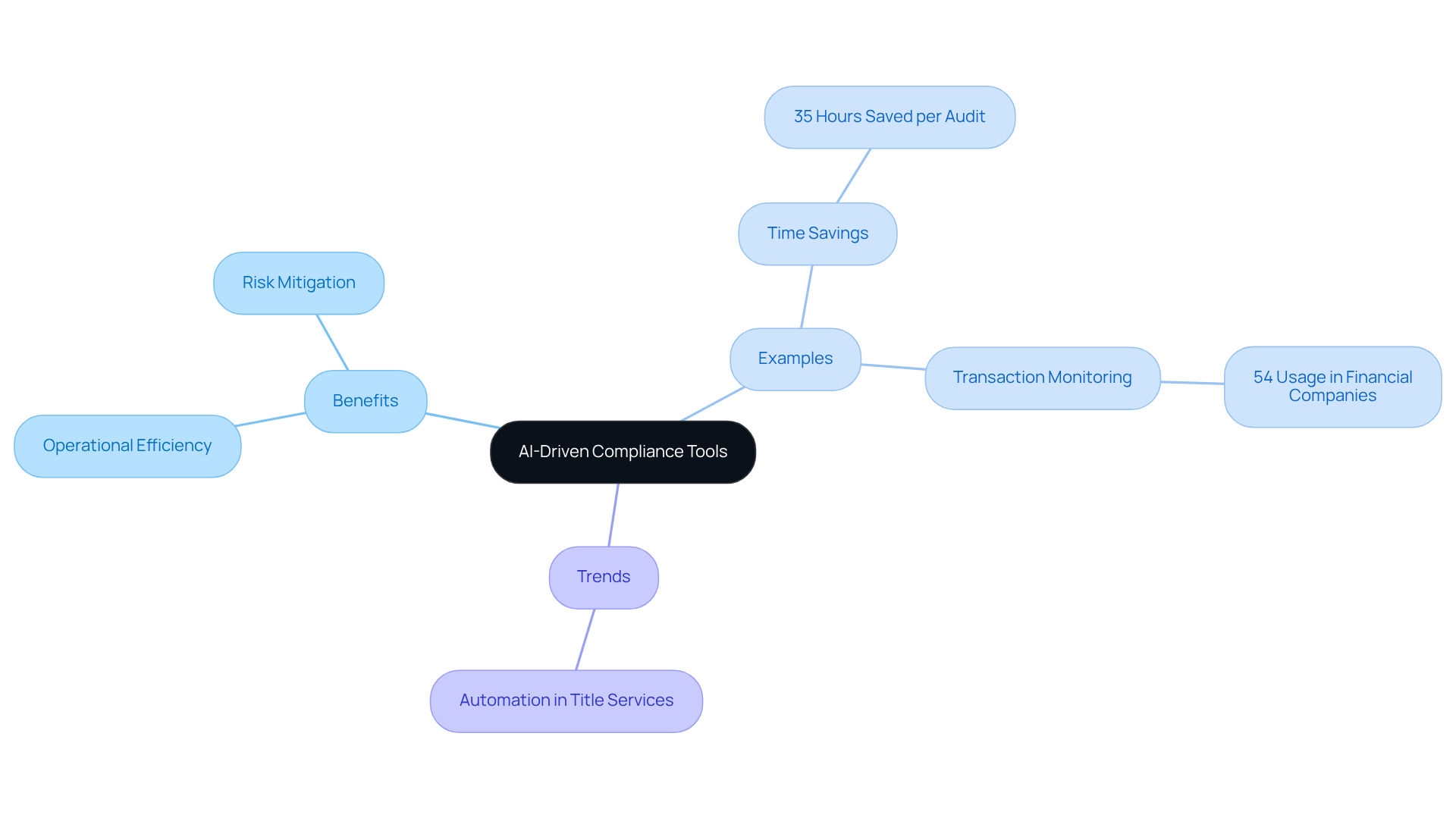
Blockchain Technology: Enhancing Transparency in Title Transactions
Blockchain technology offers a decentralized and immutable ledger for documenting ownership transactions, significantly enhancing transparency and security in real estate. By providing a clear and verifiable history of ownership, it effectively mitigates fraud and disputes, thereby fostering trust among stakeholders. This innovation aligns with automation trends in title services by streamlining the ownership transfer process and reducing traditional due diligence time from weeks to mere hours.
For instance, Sweden's land registry system has showcased a remarkable 30% reduction in overall transaction costs by implementing automation trends in title services, including automated verification, instant money transfers, and paperless processing. Furthermore, platforms like Propy have achieved a 32.4% faster transaction time while decreasing costs by 27.8%, emphasizing how automation trends in title services highlight the practical benefits of blockchain in real estate.
The implementation of smart contracts exemplifies the automation trends in title services by further automating property documentation through verifying and ensuring compliance, thereby enhancing transaction reliability. Consequently, property records are updated instantly upon transaction completion, reinforcing the integrity of ownership records and minimizing the risk of fraud.
However, it is crucial to acknowledge the challenges of blockchain adoption, including the shortage of qualified blockchain developers and the significant investment in technical resources and expertise necessary for successful implementation.
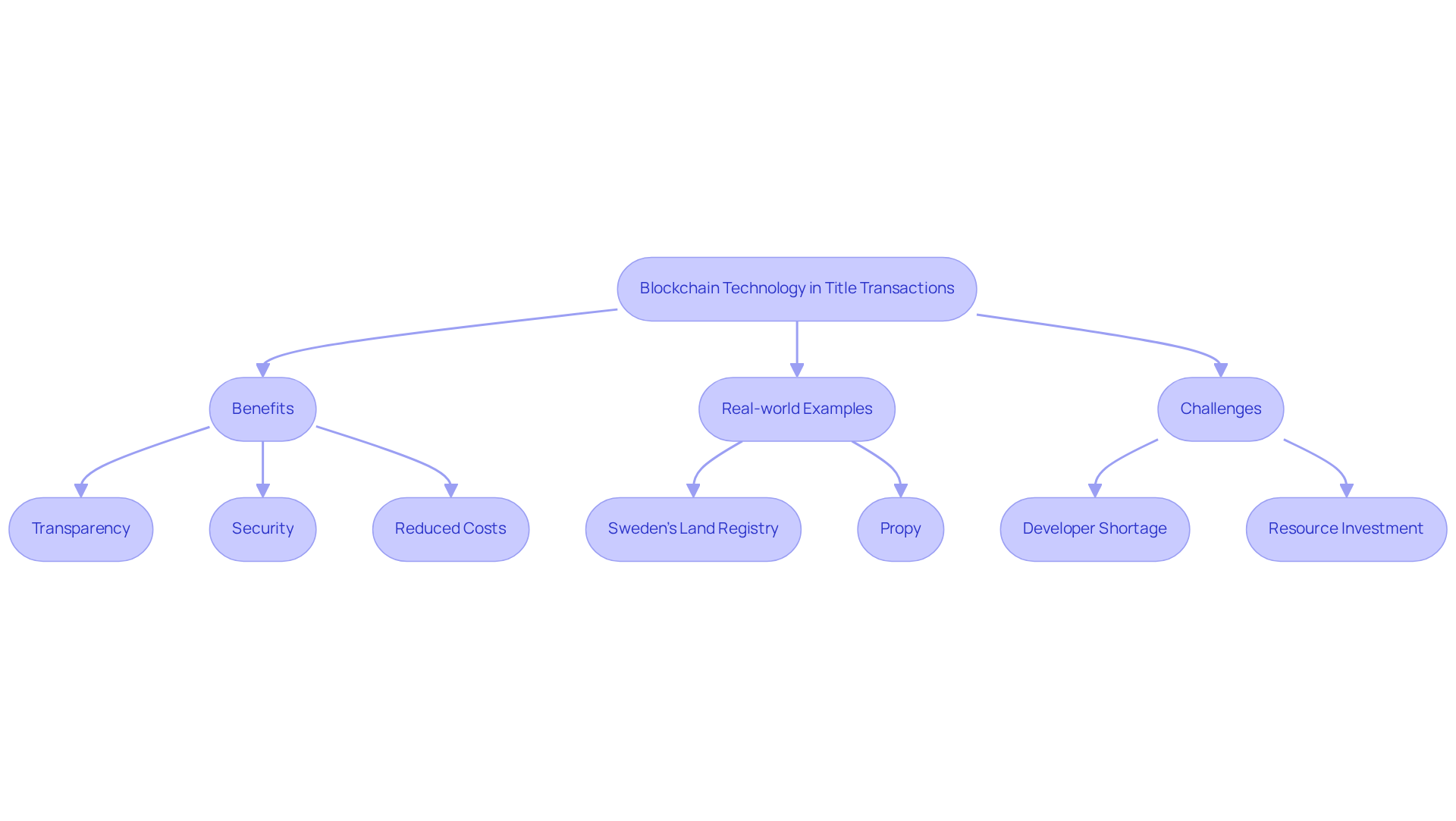
Behavioral Analytics: Understanding Client Preferences in Title Research
Behavioral analytics is pivotal in scrutinizing customer interactions and preferences, enabling providers to customize their offerings with precision. By analyzing customer engagement with service offerings, providers can tailor solutions to meet specific requirements, significantly enhancing overall satisfaction. This data-driven approach not only anticipates customer needs but also fosters a more personalized experience, which is vital for cultivating loyalty and trust.
Furthermore, Parse AI exemplifies this concept by employing machine learning to optimize title research, which highlights the automation trends in title services by facilitating faster and more accurate responses to customer inquiries. Such innovations demonstrate how a deep understanding of customer behavior can lead to improved service delivery and stronger customer relationships.
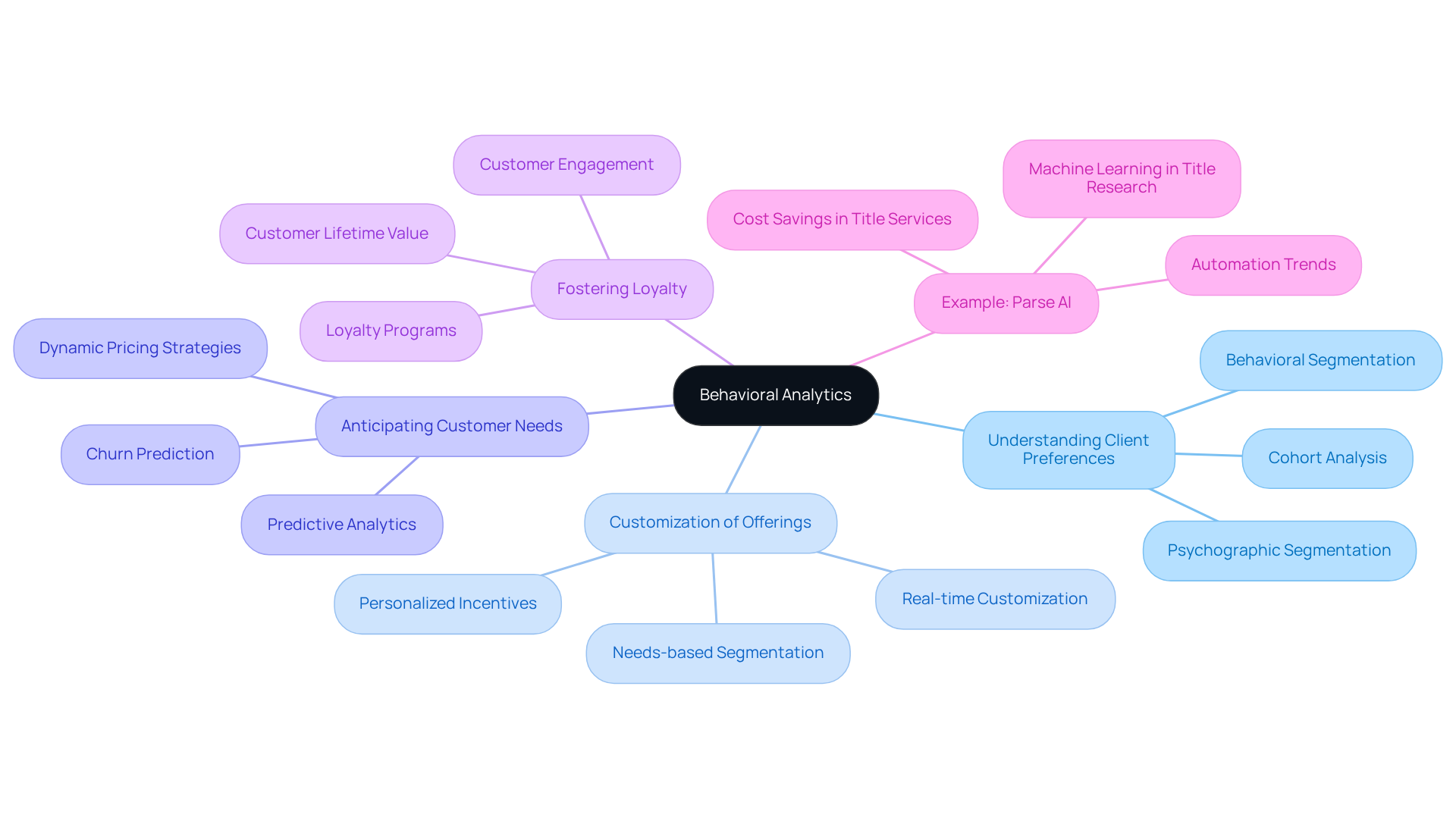
Mobile-First Marketing: Engaging Clients on Their Devices
Mobile-oriented marketing approaches are essential for enhancing user experience on portable devices, allowing customers to easily access information and amenities while traveling. By customizing websites and content for these devices, title service providers can significantly boost engagement and expand their reach. This strategy not only meets customer expectations—considering that over 75% of real estate searches occur on handheld devices and 80% of B2B purchasers utilize them during their buying journey—but also positions businesses for success in a landscape where portable access constitutes more than 64% of web traffic.
Furthermore, handheld devices accounted for 58.33% of global website traffic in Q1 2023. As portable devices increasingly become the primary means of internet access, ensuring a seamless experience is crucial for retaining customers and driving conversions. Businesses that prioritize optimization for portable devices can expect enhanced client interactions and satisfaction, ultimately leading to improved business outcomes in the competitive real estate market.
As Muninder Adavelli states, "If your site is slow, cumbersome, or not designed for portable devices, users won’t stay, and they won’t return." Moreover, with 88% of users not returning after a negative experience on their devices, the stakes for optimization are higher than ever. In light of challenges such as shrinking margins and shifting commission structures, mobile optimization is not merely advantageous; it is imperative.
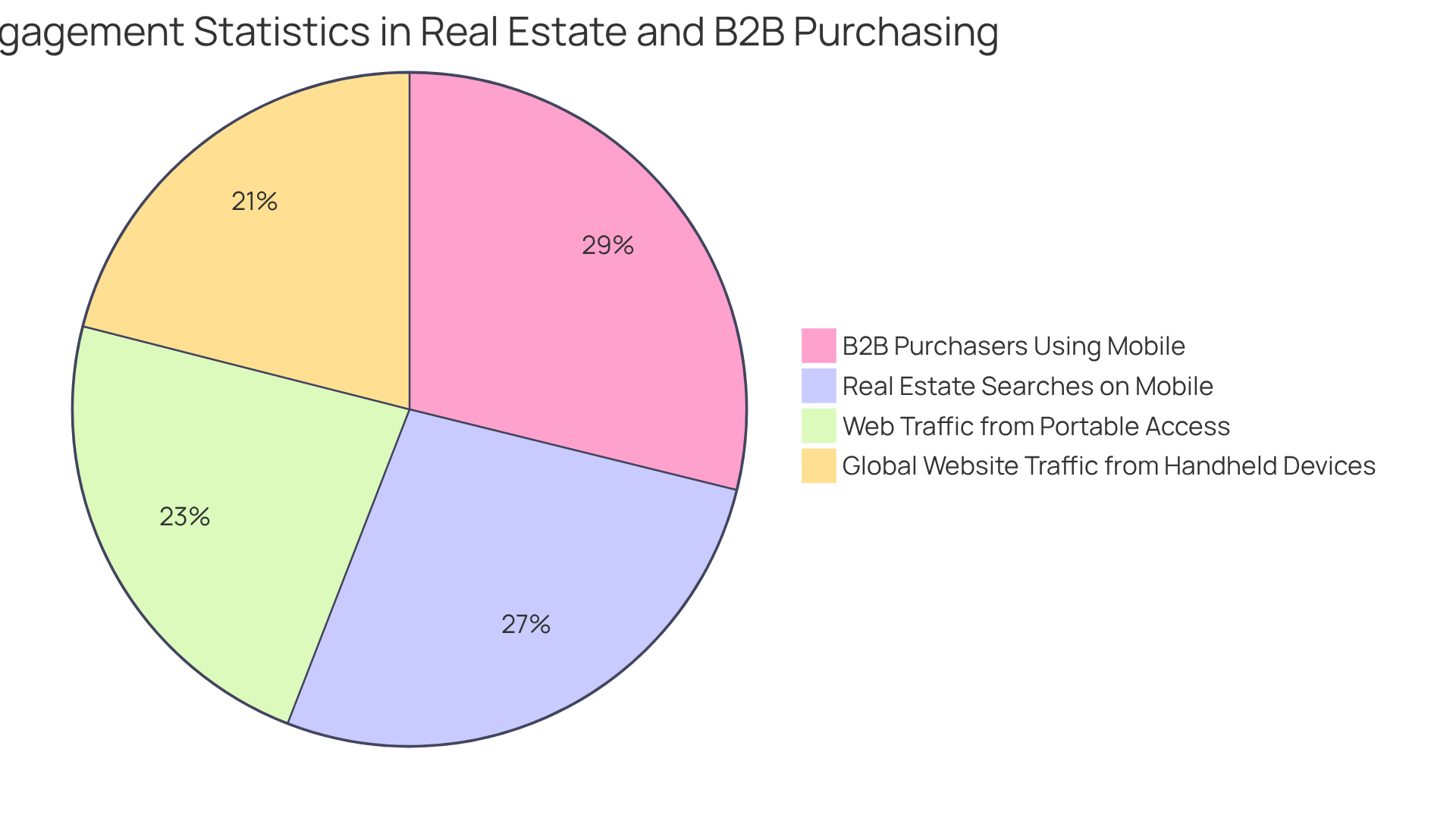
Conclusion
The landscape of title services is undergoing a profound transformation driven by automation technologies that enhance efficiency and accuracy. By incorporating advancements such as machine learning, OCR, and AI, title service providers can streamline their operations, reduce processing times, and ultimately improve client satisfaction. This evolution not only positions companies for competitive advantage but also aligns with the growing demand for faster and more reliable title services.
Throughout this article, key trends have been explored, including:
- The adoption of generative AI for content creation
- Predictive analytics for risk assessment
- Automated document processing for title searches
Each of these innovations contributes to a more efficient workflow, allowing professionals to focus on strategic decision-making rather than mundane tasks. Furthermore, the integration of chatbots and omnichannel marketing strategies enhances customer interaction and engagement, further solidifying the importance of automation in the title services sector.
As the industry continues to evolve, embracing these automation trends is essential for staying ahead of the curve. Title service providers must leverage these technologies not only to enhance operational efficiency but also to foster stronger relationships with clients. The future of title services lies in the ability to adapt and innovate, ensuring that businesses remain responsive to client needs in an increasingly competitive marketplace.
Frequently Asked Questions
What is Parse AI and how does it improve title research?
Parse AI utilizes machine learning and optical character recognition (OCR) to automate the extraction of vital information from document titles, allowing researchers to efficiently process large data sets and significantly reduce the time needed for abstracts and reports.
What are the benefits of using OCR technology in title services?
The integration of OCR technology can improve operational efficiency by 40-60% within two years of implementation and achieve a return on investment (ROI) of 200% in the first year, showcasing the effectiveness of automation trends in title services.
How does Parse AI impact the accuracy of data extraction in title services?
Organizations using intelligent document processing (IDP) solutions like Parse AI can achieve data extraction accuracy rates exceeding 99%, as demonstrated by Arbor Realty Trust, which reported a straight-through processing rate of over 95%.
What role does generative AI play in title services?
Generative AI tools enhance the production of reports, summaries, and marketing content, allowing providers to maintain consistent communication with customers, save time, and improve clarity in messaging, ultimately leading to better client satisfaction and retention.
How does predictive analytics transform risk assessment in title services?
Predictive analytics uses historical data and machine learning to identify potential risks in property transactions, enabling service providers to make informed decisions that reduce the likelihood of disputes or legal issues.
Why is proactive risk management important in the current economic landscape?
With a significant number of risks present in today’s global economy, proactive risk management is crucial for fostering secure and dependable transactions in the title services sector.
What future trends are expected with the use of machine learning in title services?
As machine learning continues to advance, its integration into risk assessment tools is expected to enhance the accuracy and efficiency of property transaction evaluations, improving outcomes for all stakeholders involved.




